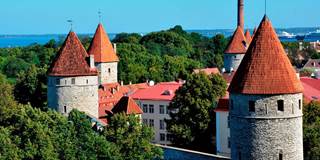News media nowadays are rife with speculation about whether – if not when – US President Donald Trump and Russian President Vladimir Putin will divide the world between them. The people of Estonia and the other Baltic states now fear being consigned to Russia’s sphere of influence yet again.
TALLINN – News media nowadays are rife with speculation about whether – if not when – US President Donald Trump and Russian President Vladimir Putin will divide the world between them. We in Estonia and the other Baltic states now fear being consigned to Russia’s sphere of influence once more. Indeed, for many Baltic citizens, suppressed visions of torture, deportations, and flight – all experiences from our recent history – are once again bursting into our consciousness.

TALLINN – News media nowadays are rife with speculation about whether – if not when – US President Donald Trump and Russian President Vladimir Putin will divide the world between them. We in Estonia and the other Baltic states now fear being consigned to Russia’s sphere of influence once more. Indeed, for many Baltic citizens, suppressed visions of torture, deportations, and flight – all experiences from our recent history – are once again bursting into our consciousness.